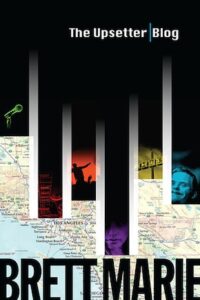Ink blots in the trunk
by Brett Marie
“An accomplished, polished, surprisingly moving piece of writing. There’s tons to admire here.” Gavin Extence
Every aspiring writer is familiar with the concept of the ‘trunk novel’. This is the novel that doesn’t make it to the bookshelf, but instead gets tucked into a bottom desk drawer or old USB drive after refusing to do what its writer wants it to do. Often it’s the writer’s first attempt at a book-length story, riddled with plot holes, misused words, navel-gazing, and all the cringeworthy darlings the writer didn’t have it in them to kill. Sometimes it’s that almost-there manuscript that makes the rounds with agents and publishers, racking up personalised rejections filled with praise and encouragement but always falling just short of an acceptance. In either case, the writer eventually catches the whiff of death coming from their book, and sets it aside.
My debut novel The Upsetter Blog was very nearly such a book. Its original longhand draft, written in sentence-long fits and starts during stolen moments of my twenties, looked destined to fall into the ‘botched first attempt’ category. By my fortieth birthday, after round upon round of edits had knocked the manuscript into shape, I’d hit the bottom of a long list of potential publishers, and despite more than one enthusiastic near-miss, I ran myself through the five stages of grief and closed my ‘TUB Submissions’ folder for the last time.
The Upsetter Blog had begun its life as an untitled short story about a rock band’s front man who blows an important gig. Of course it had. I’d written the opening lines as a twenty-three year-old singer-songwriter-guitarist fronting an LA-based group. One of the first things you learn as an author is ‘Write what you know’ and I’m not a rule-breaker by nature.
Okay, I knew a little bit more than that back then. I knew how it felt to be a young newlywed, far from home in a new city. I knew the hopes and anxieties of a father-to-be. And I knew the tedium of a day-job, working forty hours a week in the head office of a Beverly Hills limousine service. Gigging and rehearsing by night, by day I found myself tapping out a word or two here and there between calls to drivers, as a channel for the creative juices that refused to stop flowing when I set my instrument down.
Throughout my twenties, my life picked up speed, sweeping me out of the LA club scene and off to Europe with my wife and then-three-year-old daughter. It took time for us to settle, and for a while I wondered if we’d ever stop moving. By contrast, my story’s evolution into a novel was glacial, and so if I were to plot its various scenes on a map according to where I was living when I conceived them, the line they formed would stretch across an ocean, snaking through three countries across two continents, making stops in five cities and seven different rental properties.
My story ballooned to 140,000 words. But writing is about far more than word counts. It was the succession of life events that I underwent across those years that made those thousands of words into a novel.”
But the die for my writing process had been cast right in that LA office, and at every subsequent job I held my work in progress, a short story no longer, would grow on company time. At Borders Books in Coventry, England, I spent long stretches of my shifts standing at the information desk, waiting to be needed. The desk was stocked with A6 pads, presumably for staff to jot down book titles or ISBNs for our customers. I hardly ever used those sheets for that purpose. Instead, over the course of my two-year stint wearing the red Borders polo shirt, I filled pad after pad with first-draft scribblings. When Borders closed its doors for the last time in December 2009, I lucked into my next dead-end job, processing clothing drop-offs at Johnsons dry cleaners. The branch I worked at was a tiny outpost with only a single washer and dryer, an ironing board, and a key-cutting machine. Their management’s laissez-faire attitude allowed me to bring my laptop to work and type up my longhand Borders sheets in between tagging suits and ironing shirts.
My day-job environment assured that I could put words on the page, if only sporadically. As a result, my story ballooned to 140,000 words. But writing is about far more than word counts. It was the succession of life events that I underwent across those years that made those thousands of words into a novel. Beyond the rock-band soap operas that I had meant to channel from my real life into fiction from the outset, there came the accidents, the deaths in the family, the constant background thrum of current events whose tremors occasionally hit me directly – and the biggest jolt of all, the new life that fell into my lap, bringing with it a host of new issues my brain would need to work through.
These life events came scattershot at me, so thick and fast that the only chances I had to process them were in the fleeting moments I snuck to write my ostensible fiction. As a result, although the plot I had laid out was a complete fabrication, the very real mixture of hopes, fears, dreams and doubts churning around in my brain invariably spilled out onto the page. My novel became like a Rorschach test in reverse: a blank surface onto which I would project my impressions in blots of black ink.
With so much of my subconscious poured onto this canvas, it makes sense that not only main character Jack Hackett (the singer for the rock band the Flak Jackets), but also the narrator Henry Barclay (a washed-up writer roped in to blog Jack’s exploits on a nationwide tour), would assume more and more of my own characteristics. As my real-life gigs became less frequent, writing the elder Henry’s observations of the younger Jack became something akin to squinting at my twenty-three-year-old self as he receded in my rear-view mirror. Jack is in most ways different from me – hot-headed, standoffish, given to drinking – but he shares my passion for music, my drive for success, and most importantly my younger self’s longings for love and fears of ending up alone. Henry is older, and though he’s not exactly a sage to begin with, he does grow wiser as the book progresses. It occurs to me now how much of the wisdom Henry acquires was in fact coming to me as the book’s plot moved forward in tandem with my life. Reading the finished book, I can see it for what it was: a letter from my present self to that young man so filled with longings and fears, offering him hope that things might turn out all right.
I kept coming back to Jack and Henry, tinkering with their voices… even as I agonised over my revisions, I drew comfort from watching the same life lessons unfold for my characters anew.”
The novel’s journey from first to final draft took a decade to complete. In that time I began to branch out as a writer, finding success with short fiction, honing my craft as a reviewer and essayist with Bookanista, and writing and revising the first draft of my second novel. But whatever my current projects were, I kept coming back to Jack and Henry, tinkering with their voices, dialling down their less savoury attributes, bringing the book’s bloated word count down to a more digestible 90,000 words. Unlike any of my other projects, coming back to this book was always a relief; even as I agonised over my revisions, I drew comfort from watching the same life lessons unfold for my characters anew. And although it pained me to conclude in early 2020 that it was time to move on from them, that pain was blunted by the knowledge that their story had already done its job for me, a hundred times over.
An email arrived from Owl Canyon Press two months later, offering me a contract. Just like that, Jack and Henry came rushing back into my life. For the next year I became immersed once more in their trials. Diving deep for the final edit, I read and reread their story more times than I could count, but for all the time I spent with them, I never got bored. And now, as feedback trickles back to me from advance readers, I’ve come to know a new delight: this letter I’d written to myself has been forwarded on to the wider world, and in the heartfelt responses I’ve received from these first readers, I see the ink blots I poured into it reinterpreted and projected back at me in new and surprising ways. I could have accepted failure, and been happy knowing that at least Jack and Henry would always be there in their trunk, ready to perform for me whenever I needed them. It thrills me to no end that they managed to climb back out.
 Brett Marie, also known as Mat Treiber, grew up in Montreal with an American father and a British mother and currently lives in Herefordshire. His short stories and other writing have appeared in publications including The New Plains Review, The Impressment Gang, PopMatters and Bookanista, where he is a contributing editor. The Upsetter Blog is out now from Owl Canyon Press.
Brett Marie, also known as Mat Treiber, grew up in Montreal with an American father and a British mother and currently lives in Herefordshire. His short stories and other writing have appeared in publications including The New Plains Review, The Impressment Gang, PopMatters and Bookanista, where he is a contributing editor. The Upsetter Blog is out now from Owl Canyon Press.
Read more
@owlcanyonpress
Facebook: Brett Marie
@brettmarie1979
bookanista.com/author/brett-marie/
Author portrait © Roxanne Fontana

